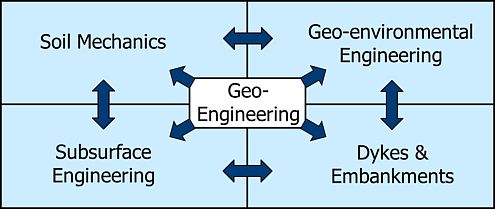Research
In Geo-Engineering there are new challenges as we strive to build a sustainable society. We increasingly need to build on, in, under and with soils that may be classed as problematic: such as very soft soils, saturated soils, reclaimed soils and polluted soils. We increasingly need to reassess the stability of existing structures: for example, due to rising sea level and degradation of soils under changing environmental conditions. There are also new “soils” that need to be characterized, modelled and stored: such as waste materials arising from domestic and industrial processes. In addition, there are the increasing demands of society for codification and for quantifying and managing risks effectively.
The section Geo-Engineering aims to improve the fundamental understanding of materials and processes in the shallow subsurface, with a particular emphasis on providing engineering solutions for a delta environment. To this end we develop fundamental knowledge and innovative technology, which is essential to address current societal issues for:
- Safe constructions in, on and with ground materials (with a special focus on soft soils)
- Minimising the risk and impact of geo-hazards
- Increasing the lifetime of existing soil structures (both manmade and natural)
- Sustainable use of the sub-surface
To address research related to the needs of society, in line with the section’s mission, we divide the research programme into 4 interconnecting themes, which additionally have natural links to other sections within the Department and wider Faculty. These are:
Because research of the unit geo-Engineering focuses on the behaviour of, and engineering in and with, problematic deltaic soils we have a strong multi-disciplinary research team dedicated to the complex, coupled, non-linear and heterogeneous nature of geo-materials. This includes expertise in element testing, constitutive modelling, coupled processes, instrumentation, physical modelling, and numerical and probabilistic modelling. There is a natural and strong connectivity between all themes and it is common for staff members to contribute to more than one, or all, themes.

The laboratory is very important for performing our research and is well-equiped. The facilities are strong assets of the section; they increase the potential for collaboration with other departments and industry. Foreseeing that construction and exploitation activities will move to more adverse conditions, e.g. deeper underground, as well as further and deeper offshore, the arctic and less favourable subsurface conditions, our laboratory is well equipped to study such challenges.